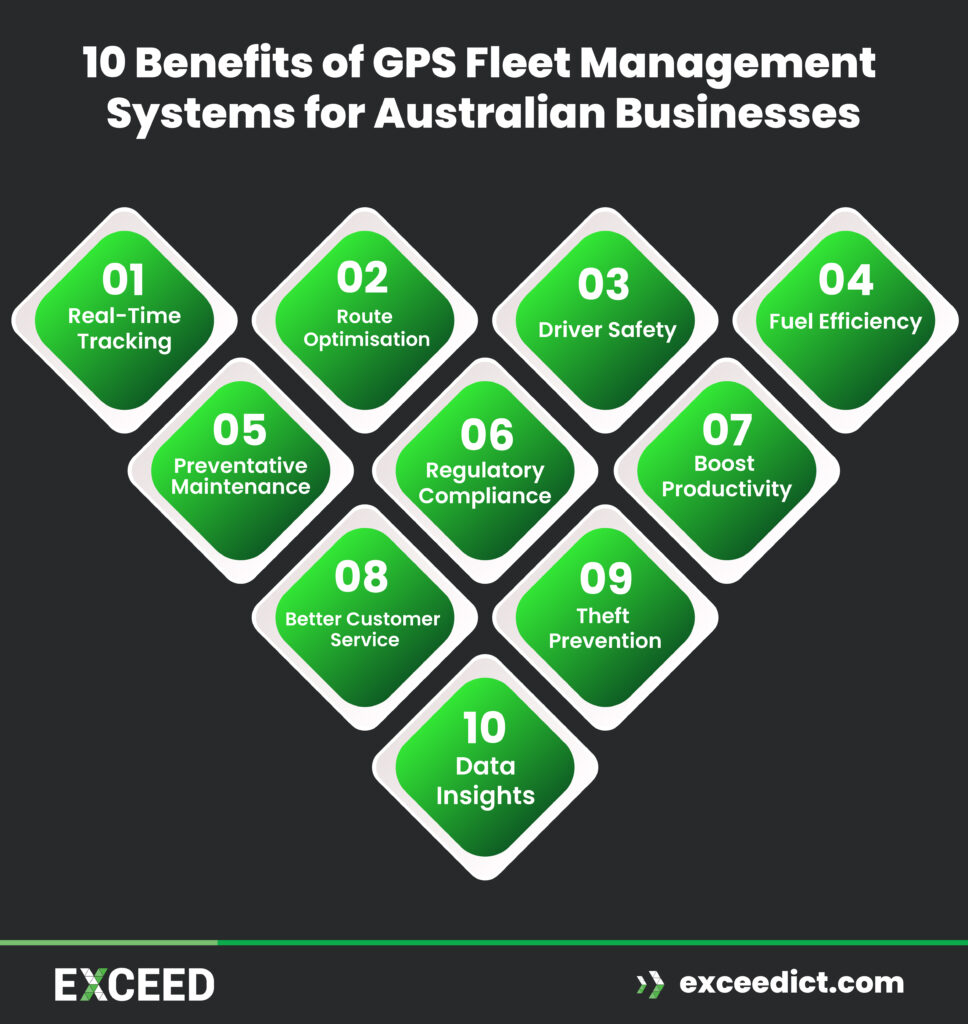
As businesses across Australia continue to expand their operations, managing a fleet efficiently has become crucial. GPS fleet management systems have emerged as an indispensable tool, allowing businesses to track, monitor, and optimise their vehicle operations in real time. This technology enhances productivity, reduces costs, and improves safety. Here’s a comprehensive look at the top 10 benefits of implementing a GPS fleet management system for Australian businesses.
1. Real-Time Vehicle Tracking

One of the primary advantages of GPS fleet management systems is real-time tracking, which allows businesses to monitor their fleet’s exact location at any given moment.
Key Benefits:
- Provides live updates on vehicle locations, helping fleet managers make informed decisions.
- Improves operational control, ensuring vehicles are following assigned routes.
- Enhances security by quickly locating stolen or misplaced vehicles.
- Helps businesses provide accurate delivery times to customers, improving service quality.
Example: A logistics company can track a delivery truck in real time, enabling better route planning and improving customer communication.
2. Improved Route Optimisation
Efficient route planning is essential for reducing operational costs and improving service delivery. GPS fleet management systems analyse traffic patterns, road conditions, and distance to suggest the best routes.
Key Benefits:
- Reduces travel time by avoiding congested roads.
- Minimises fuel consumption and operational expenses.
- Decreases vehicle wear and tear, extending their lifespan.
- Increases the number of trips or service calls a fleet can complete daily.
Example: A courier company can optimise delivery routes, reducing delays and improving efficiency.
3. Enhanced Driver Safety and Behaviour Monitoring
Unsafe driving habits can lead to accidents, higher insurance costs, and increased maintenance expenses. GPS fleet management systems monitor driver behaviour, providing insights into areas that need improvement.
Key Benefits:
- Tracks speeding, harsh braking, rapid acceleration, and idling.
- Sends alerts and reports on unsafe driving patterns.
- Helps businesses implement targeted driver training programs.
- Reduces the risk of accidents, lowering liability and insurance costs.
Example: A construction company can use GPS data to ensure its heavy-duty vehicle operators follow safety guidelines.
4. Reduced Fuel Costs and Consumption
Fuel expenses are one of the biggest costs associated with fleet management. GPS tracking can significantly help in reducing unnecessary fuel usage.
Key Benefits:
- Identifies and eliminates excessive idling, which wastes fuel.
- Tracks fuel efficiency and helps identify vehicles that consume more than expected.
- Supports eco-driving initiatives by promoting fuel-efficient driving habits.
- Integrates with fuel card systems to prevent fraud and monitor fuel expenses.
Example: A delivery service can reduce operational costs by identifying fuel-wasting behaviours such as excessive idling and inefficient routes.
5. Preventative Vehicle Maintenance
Regular vehicle maintenance is key to keeping fleet operations running smoothly. GPS fleet management systems provide automated alerts and reminders for scheduled servicing.
Key Benefits:
- Reduces unexpected breakdowns by ensuring timely servicing.
- Increases vehicle lifespan and resale value.
- Lowers repair costs by catching small issues before they become major problems.
- Minimises downtime and keeps operations running efficiently.
Example: A taxi company can set up automated maintenance schedules, ensuring their vehicles are always road-ready.
6. Compliance with Australian Regulations
Australia has strict transport regulations that fleet operators must adhere to, including fatigue management laws, vehicle safety standards, and emissions regulations.
Key Benefits:
- Ensures vehicles comply with Australian Transport Safety Bureau (ATSB) regulations.
- Helps drivers adhere to work-rest balance laws by tracking driving hours.
- Automates digital logbooks to maintain accurate compliance records.
- Reduces the risk of fines and legal issues.
Example: A freight company using GPS tracking can ensure its drivers follow rest break regulations, reducing fatigue-related risks.
7. Increased Productivity and Efficiency
By automating many aspects of fleet management, businesses can improve overall productivity and efficiency.
Key Benefits:
- Minimises delays caused by poor route planning and unplanned stops.
- Automates fleet reporting and analytics, reducing manual work.
- Enhances workforce accountability by tracking driver performance.
- Allows remote fleet management, even from mobile devices.
Example: A plumbing business can monitor technician availability in real time, allowing for better scheduling and faster service calls.
8. Better Customer Service and Satisfaction
GPS fleet tracking allows businesses to enhance customer experience by providing accurate arrival estimates and ensuring timely deliveries.
Key Benefits:
- Provides customers with real-time tracking of their deliveries or services.
- Reduces wait times by ensuring more accurate estimated arrival times.
- Enhances reliability and trust by meeting delivery commitments.
- Enables businesses to respond quickly to customer inquiries and issues.
Example: An e-commerce company using GPS fleet management can provide live delivery tracking to customers, increasing transparency and satisfaction.
9. Theft Prevention and Asset Security
Vehicle theft and unauthorised use are major concerns for fleet managers. GPS tracking adds an extra layer of security to fleet operations.
Key Benefits:
- Sends alerts when a vehicle moves outside designated areas (geofencing).
- Allows quick recovery of stolen vehicles by pinpointing their exact location.
- Reduces the likelihood of vehicle misuse by employees.
- Lowers insurance premiums by enhancing security measures.
Example: A car rental business can use geofencing alerts to track when vehicles leave designated rental areas.
10. Data-Driven Decision Making
Modern fleet management relies on data analytics to improve efficiency and profitability. GPS fleet management systems collect and analyse valuable data to drive better decision-making.
Key Benefits:
- Tracks key performance indicators (KPIs) like fuel usage, trip efficiency, and vehicle downtime.
- Helps businesses identify trends and areas for improvement.
- Supports cost management strategies by analysing operational expenses.
- Provides reports for business growth and strategic planning.
Example: A logistics company can use historical data to optimise fleet performance, ensuring maximum efficiency.
Conclusion

GPS fleet management systems are revolutionising the way Australian businesses manage their vehicles. From improving operational efficiency and reducing costs to enhancing security and customer service, these systems offer numerous benefits.
By leveraging real-time tracking, driver behaviour monitoring, predictive maintenance, and data analytics, businesses can streamline their fleet operations, comply with regulations, and ultimately boost profitability.
FAQs About GPS Fleet Management Systems for Australian Businesses
What is a GPS fleet management system?
A GPS fleet management system is a technology solution that tracks, monitors, and manages vehicles using GPS and telematics data. It helps businesses optimise routes, improve safety, and reduce costs.
How does a GPS fleet management system work?
These systems use GPS tracking devices installed in vehicles to collect real-time location, speed, and performance data. This data is then transmitted to a cloud-based platform, allowing fleet managers to monitor and manage their vehicles remotely.
Is GPS fleet management legal in Australia?
Yes, GPS fleet tracking is legal in Australia as long as businesses comply with privacy laws. Employees must be informed about tracking policies, and consent may be required in certain cases.
How can GPS tracking help reduce fuel costs?
GPS tracking helps reduce fuel costs by identifying inefficient routes, minimising idling time, and encouraging fuel-efficient driving habits through driver behaviour monitoring.
Can GPS fleet management systems improve driver safety?
Yes, these systems track driver behaviour, including speeding, harsh braking, and acceleration patterns. Businesses can use this data to provide training and improve road safety.
How do GPS fleet management systems prevent vehicle theft?
Real-time tracking allows businesses to monitor vehicle locations and set geofences. If a vehicle is moved outside a designated area without authorisation, alerts are triggered, helping recover stolen assets quickly.
What industries benefit from GPS fleet management?
Industries such as logistics, transport, construction, delivery services, and field service operations benefit the most from GPS fleet management by improving efficiency and reducing costs.
How do I choose the best GPS fleet management system for my business?
Consider factors such as real-time tracking capabilities, integration with existing software, compliance features, customer support, and cost-effectiveness before selecting a system.
Find Related Blogs
- GPS Fleet Management for Optimising Your Business Operations.
- Fleet Management Services for Enterprises in Australia.
- A Comprehensive Guide to Fleet Management Services in Australia.
- Unveiling the Power of GPS Fleet Management Solutions: A Guide to boost productivity for businesses


